Giacomo Leopardis Search for
a Common Life through Poetry
The Fairleigh Dickinson University Press
Series in Italian Studies
General Editors: Dr. Anthony Julian Tamburri, Dean, and John D. Calandra,
Italian American Institute (Queens College-CUNY)
The Fairleigh Dickinson University Press Series in Italian Studies is devoted to the publication of scholarly works on Italian literature, film, history, biography, art, and culture, as well as on intercultural connections, such as Italian-American Studies.
Recent Publications in Italian Studies
Rosengarten, Frank, Giacomo Leopardis Search for a Common Life through Poetry: A Different Nobility, a Different Love (2012)
Ducci, Lucia, George P. Marsh Correspondence: Images of Italy, 18611881 (2012)
Godey, Amber R., Sister Souls: The Power of Personal Narrative in the Poetic Works of Antonia Pozzi and Vittorio Sereni (2011)
Verdicchio, Pasquale, Looters, Photographers, and Thieves: Aspects of Italian Photographic Culture in the Nineteenth and Twentieth Centuries (2011)
Parati, Graziella, and Anthony Julian Tamburri (eds.), The Cultures of Italian Migration (2011)
Trubiano, Marisa S., Ennio Flaiano and His Italy: Postcards from a Changing World (2010)
Halliday, Iain, Huck Finn in Italian, Pinocchio in English: Theory and Praxis of Literary Translation (2009)
Serram Ilaria, The Imagined Immigrant: The Images of Italian Emigration to the United States between 1890 and 1924 (2009)
Lucamante, Stefania (ed.), Italy and the Bourgeoisie: The Re-Thinking of a Class (2009)
Van Order, Thomas, Listening to Fellini: Music and Meaning in Black and White (2008)
Billiani, Francesca, and Gigliola Sulis, The Italian Gothic and Fantastic: Encounters and Rewritings of Narrative Traditions (2008)
Orton, Marie, and Graziella Parati (eds.), Multicultural Literature in Contemporary Italy (2007)
Scambray, Ken, Queen Calafias Paradise: California and the Italian-American Novel (2007)
Polezzi, Loredana, and Charlotte Ross (eds.), In Corpore: Bodies in Post-Unification Italy (2007)
Francose, Joseph, Socially Symbolic Acts: The Historicizing Fictions of Umberto Eco, Vincenzo Consolo, and Antonio Tabucchi (2006)
Kozma, Jan (trans.), Grazia Deledda, Marianna Sirca (2006)
On the Web at http://www.fdu.edu/fdupress
Giacomo Leopardis Search for
a Common Life through Poetry
A Different Nobility, a Different Love
Frank Rosengarten
FAIRLEIGH DICKINSON UNIVERSITY PRESS
Madison Teaneck
Published by Fairleigh Dickinson University Press
Co-published with The Rowman & Littlefield Publishing Group, Inc.
4501 Forbes Boulevard, Suite 200, Lanham, Maryland 20706
http://www.rowmanlittlefield.com
10 Thornbury Road, Plymouth PL6 7PP, United Kingdom
Copyright 2012 by Frank Rosengarten
All rights reserved. No part of this book may be reproduced in any form or by any electronic or mechanical means, including information storage and retrieval systems, without written permission from the publisher, except by a reviewer who may quote passages in a review.
British Library Cataloguing in Publication Information Available
Library of Congress Cataloging-in-Publication Data
Rosengarten, Frank, 1927
Giacomo Leopardis search for a common life through poetry : a different nobility, a different love / Frank Rosengarten.
p. cm. (The Fairleigh Dickinson University Press series in Italian studies)
Includes bibliographical references and index.
ISBN 978-1-61147-505-0 (cloth : alk. paper) ISBN 978-1-61147-506-7 (ebook)
1. Leopardi, Giacomo, 17981837. I. Title.
PQ4710.R67 2012
851.7dc23
2011047774

The paper used in this publication meets the minimum requirements of American National Standard for Information Sciences Permanence of Paper for Printed Library Materials, ANSI/NISO Z39.48-1992.
Printed in the United States of America
Contents
Acknowledgments
Sources and Translations
Introduction
Part One: NobilityA Family Legacy and a Lingering Ideal
Part Two: Leopardi in Love
| 4 | The Languages of Love and Misogyny |
| 5 | A Loving Partnership and Consalvo |
Part Three: Leopardi as a Poet of the Risorgimento
| 7 | The Poetry and Rhetoric of Liberal Patriotism |
| 8 | Monaldo and Giacomo Leopardi: A Comparison |
| 9 | Unpleasant, Rancorous Leopardi |
| 10 | Leopardi in a Twentieth-Century Political Context |
Part Four: Leopardi as Poet-Philosopher
| 11 | Nihilism, Death, and the Human Condition |
| 12 | Nietzsche, Lucretius, and Leopardi |
| 13 | Leopardi between Supernaturalism and Materialism |
| 14 | How Schopenhauer Illuminates Leopardi |
Part Five: Humanism in Life and Letters
| 15 | Friendship and Classical Studies |
| 16 | Women in Leopardis Intellectual and Sentimental Life |
Bibliography
Index
Acknowledgments
In addition to the writers I mention in my introduction to this book, I am intellectually indebted to several other scholars on whose painstaking research I depended in the process of developing my own point of view concerning Leopardis life and work.
Doctor Maria Rascaglia, who administers the Leopardi and the Ranieri papers at the National Library of Naples, is my main source of insights into these two sets of documents. Her detailed descriptions of them formed part of two exceptionally useful volumes edited by Gaetano Macchiaroli containing historical, biographical, and literary-critical analyses, in addition to photographs and pictures that have enriched Leopardi studies since their appearance in 1987 and 1998. Im also grateful to Doctor Rascaglia for making her staff available to me for a variety of indispensable services.
Two other scholars whose research and perspectives were important to me are Elisabetta Benucci, masterful editor and interpreter of Leopardis letters and lesser known literary projects, and Vanna Gazzola Stacchini, who with Elio Gioanola is among the not many scholars who have used psychoanalytical methods in their studies.
In Recanati, Leopardis native city and the site of his birthplace, an imposing seventeenth-century palazzo, I was cordially received, as have been other Leopardi scholars, by Countess Anna Leopardi, who has devoted many years to making her home accessible to visiting researchers and who has produced a number of books on the history of the Leopardi family that combine personal memories with diligent research. Countess Leopardi relies for various important services on Signora Carmela Magri, who patiently informed me about the Leopardi family dwelling and the personalities of the individuals who have played important roles in its history. I appreciated her availability to me, sometimes on a moments notice, due to the relatively short time I was able to spend in Recanati.

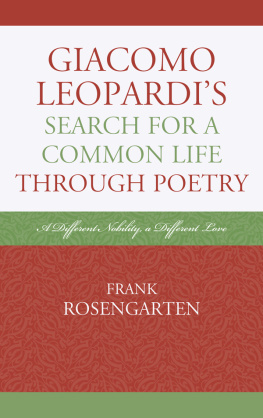
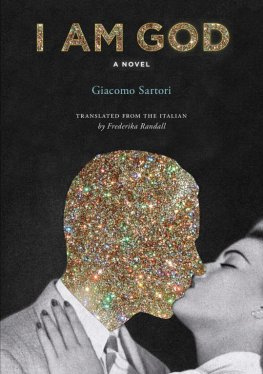

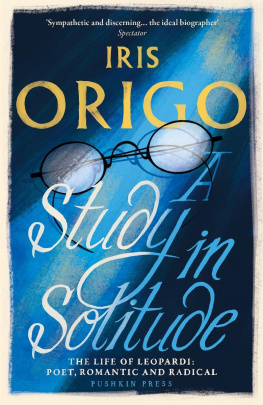
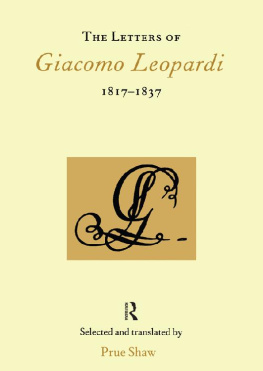
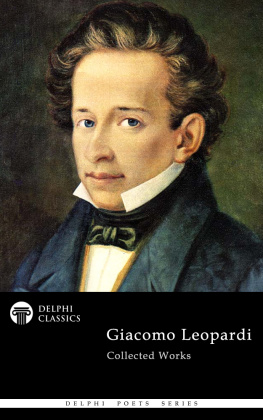
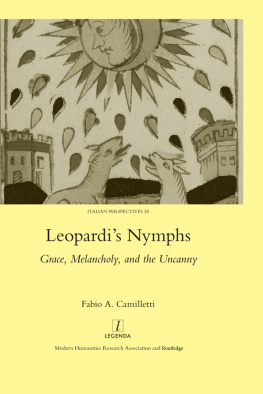
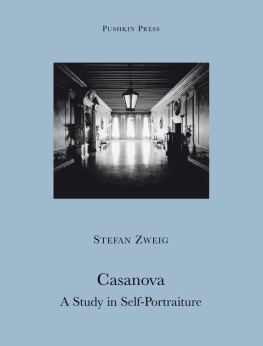
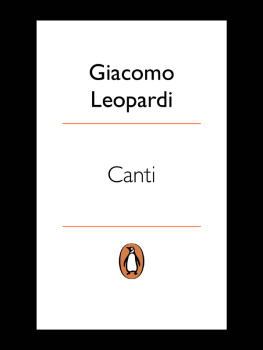
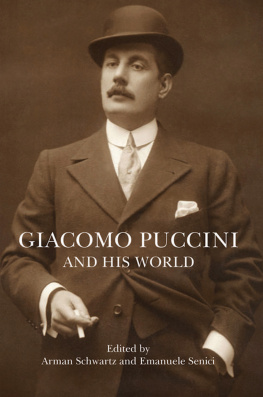
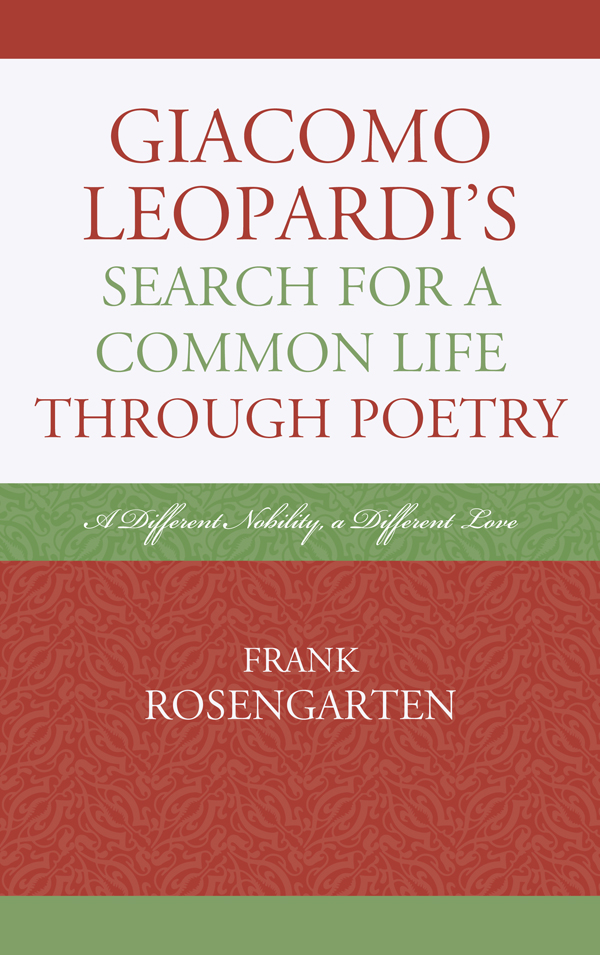

 The paper used in this publication meets the minimum requirements of American National Standard for Information Sciences Permanence of Paper for Printed Library Materials, ANSI/NISO Z39.48-1992.
The paper used in this publication meets the minimum requirements of American National Standard for Information Sciences Permanence of Paper for Printed Library Materials, ANSI/NISO Z39.48-1992.